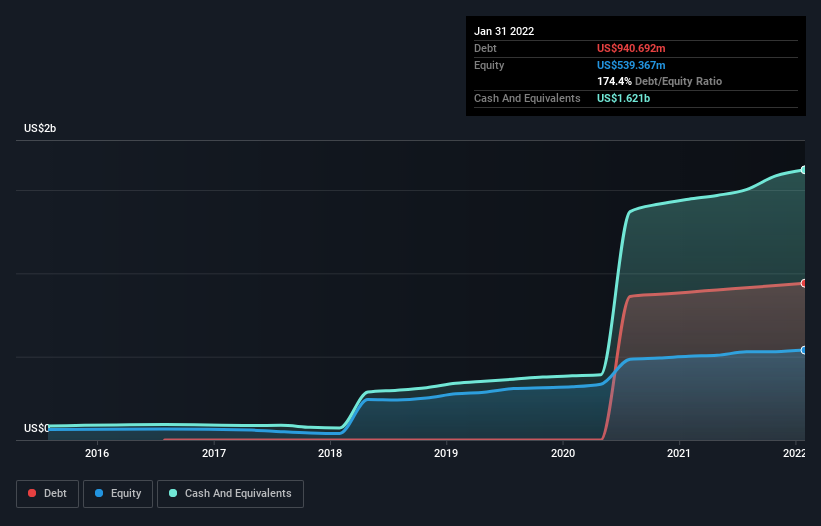Howard Marks put it nicely when he said that, rather than worrying about share price volatility, 'The possibility of permanent loss is the risk I worry about... and every practical investor I know worries about.' So it might be obvious that you need to consider debt, when you think about how risky any given stock is, because too much debt can sink a company. We can see that Zscaler, Inc. (NASDAQ:ZS) does use debt in its business. But the real question is whether this debt is making the company risky.
What Risk Does Debt Bring?
Debt assists a business until the business has trouble paying it off, either with new capital or with free cash flow. If things get really bad, the lenders can take control of the business. While that is not too common, we often do see indebted companies permanently diluting shareholders because lenders force them to raise capital at a distressed price. Of course, plenty of companies use debt to fund growth, without any negative consequences. The first step when considering a company's debt levels is to consider its cash and debt together.
See our latest analysis for Zscaler
How Much Debt Does Zscaler Carry?
You can click the graphic below for the historical numbers, but it shows that as of January 2022 Zscaler had US$940.7m of debt, an increase on US$887.2m, over one year. But on the other hand it also has US$1.62b in cash, leading to a US$680.5m net cash position.

How Healthy Is Zscaler's Balance Sheet?
Zooming in on the latest balance sheet data, we can see that Zscaler had liabilities of US$836.0m due within 12 months and liabilities of US$1.05b due beyond that. Offsetting this, it had US$1.62b in cash and US$271.8m in receivables that were due within 12 months. So these liquid assets roughly match the total liabilities.
This state of affairs indicates that Zscaler's balance sheet looks quite solid, as its total liabilities are just about equal to its liquid assets. So while it's hard to imagine that the US$31.4b company is struggling for cash, we still think it's worth monitoring its balance sheet. Succinctly put, Zscaler boasts net cash, so it's fair to say it does not have a heavy debt load! There's no doubt that we learn most about debt from the balance sheet. But it is future earnings, more than anything, that will determine Zscaler's ability to maintain a healthy balance sheet going forward. So if you're focused on the future you can check out this free report showing analyst profit forecasts.
In the last year Zscaler wasn't profitable at an EBIT level, but managed to grow its revenue by 60%, to US$860m. Shareholders probably have their fingers crossed that it can grow its way to profits.
So How Risky Is Zscaler?
While Zscaler lost money on an earnings before interest and tax (EBIT) level, it actually generated positive free cash flow US$196m. So taking that on face value, and considering the net cash situation, we don't think that the stock is too risky in the near term. Keeping in mind its 60% revenue growth over the last year, we think there's a decent chance the company is on track. We'd see further strong growth as an optimistic indication. There's no doubt that we learn most about debt from the balance sheet. But ultimately, every company can contain risks that exist outside of the balance sheet. For instance, we've identified 4 warning signs for Zscaler (1 makes us a bit uncomfortable) you should be aware of.
If you're interested in investing in businesses that can grow profits without the burden of debt, then check out this free list of growing businesses that have net cash on the balance sheet.
Valuation is complex, but we're here to simplify it.
Discover if Zscaler might be undervalued or overvalued with our detailed analysis, featuring fair value estimates, potential risks, dividends, insider trades, and its financial condition.
Access Free AnalysisHave feedback on this article? Concerned about the content? Get in touch with us directly. Alternatively, email editorial-team (at) simplywallst.com.
This article by Simply Wall St is general in nature. We provide commentary based on historical data and analyst forecasts only using an unbiased methodology and our articles are not intended to be financial advice. It does not constitute a recommendation to buy or sell any stock, and does not take account of your objectives, or your financial situation. We aim to bring you long-term focused analysis driven by fundamental data. Note that our analysis may not factor in the latest price-sensitive company announcements or qualitative material. Simply Wall St has no position in any stocks mentioned.
About NasdaqGS:ZS
Flawless balance sheet with high growth potential.
Similar Companies
Market Insights
Community Narratives



